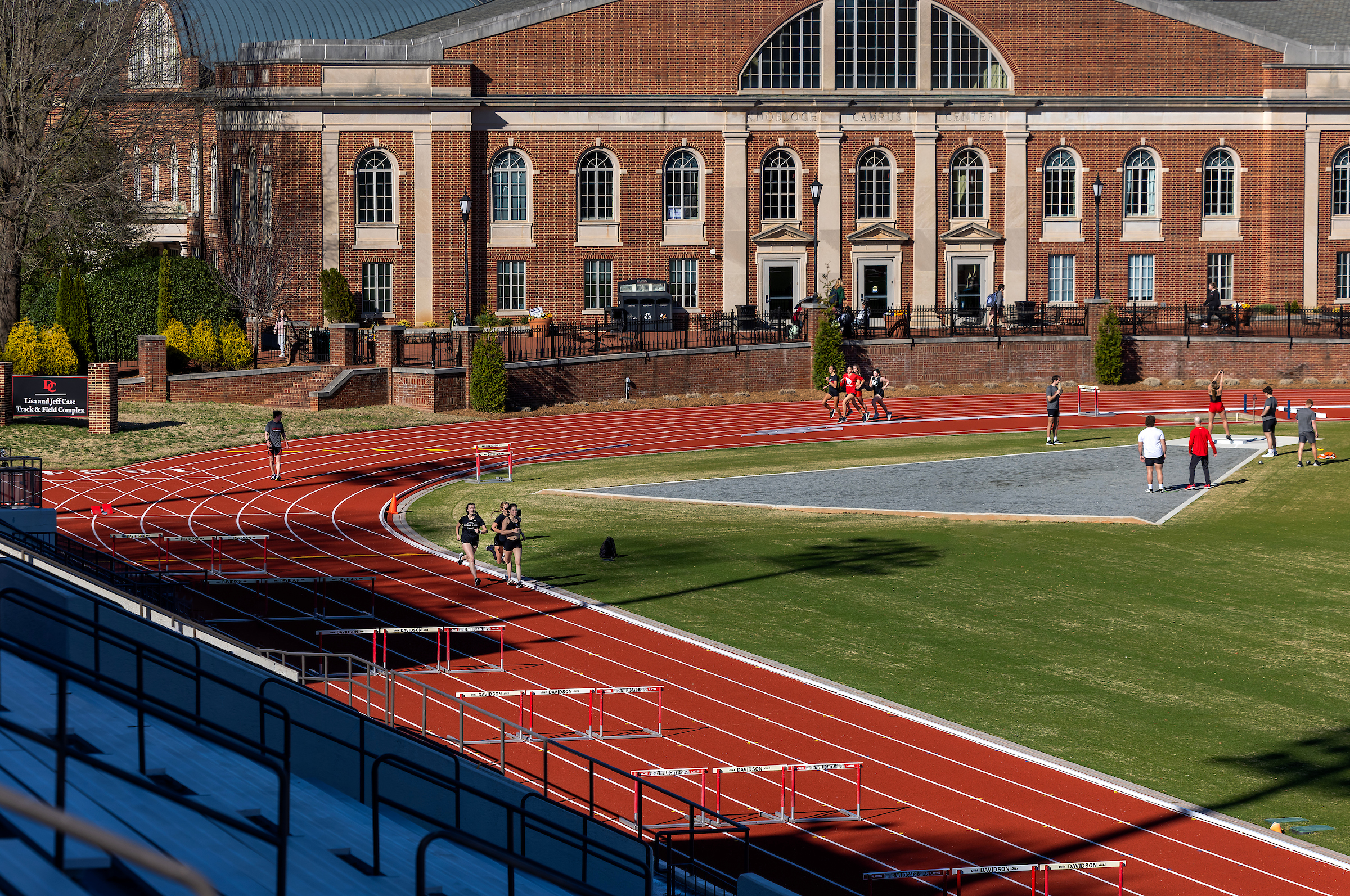A Year of War: Ukrainian Students, Refugees Will Not Face Anniversary Alone
February 19, 2023
- Author
- Mary Elizabeth DeAngelis

Valeriia Kruzhkova
On Feb. 24, 2022, Valeriia Kruzhkova woke up at 4:52 a.m. to a friend’s frantic text:
“Wake up, please wake up,” it said. “The war is starting. The Russians are bombing Kyiv!”
At 5:30 a.m., Kruzhkova heard the first explosions. By 8 a.m. she’d stuffed a suitcase full of clothes and fled from her tiny Kyiv apartment to the city’s transit center, where thousands flocked to cram onto packed trains and buses.
The world watched that frantic mass exodus on TV screens. Tanks rolled into neighborhoods, buildings imploded and frightened mothers clutched their young children. Ukraine fought off Russian troops with everything from armed soldiers to civilians wielding mops and brooms to defiant grandmothers tossing homemade Molotov cocktails at the invaders.
Russia’s plan to capture Ukraine in days has turned into a year of mass devastation, with thousands killed and wounded, homes destroyed and a democratic nation fighting for survival.
For many Americans, it’s a faraway war that pops up every few days on news feeds. For Kruzhkova, from Davidson College’s class of 2026, it’s a very real source of fear and anxiety. She worries about her family and friends, who live under the constant threat of attack.
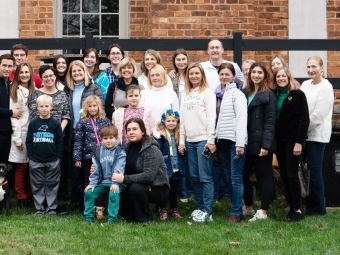
Davidson 4 Ukraine hosts weekly meetups for refugees who settled in the area after Russia invaded Ukraine.
In Davidson, some 5,200 miles from Kyiv, she and other Ukrainians follow the daily twists and turns of combat. They carry their country’s heart and determination with them. They do what they can to help from afar.
Amid the darkness of winter, the bravery of their nation and the kindnesses they’ve encountered offer moments of light. They bolster each other and draw comfort from a caring, supportive community based at Davidson College.
“Davidson 4 Ukraine” includes students, professors, staff and local residents who asked, “How can I help?” when the Russians invaded. Then they acted. They’ve provided housing, food, clothes and other necessities. They’ve steered refugees to jobs and reliable transportation. Davidson students tutor Ukrainian children as they navigate a new country and language.
On Feb. 23, 2023, Davidson College held a ceremony and fundraising event to commemorate the anniversary of the attack. Kruzhkova was among the speakers raising awareness and resources for her country. The college’s Russian Studies Department and Dean Rusk Program, Davidson 4 Ukraine and the Ukrainian Congress Committee of America (UCCA) in Charlotte sponsored the event. The money raised will buy urgently needed medical supplies for Ukraine.
For Kruzhkova and other Ukrainians, the support and friendship they’ve found in the Davidson community has been a lifeline to the home and country they love and hope to go back to someday.
A year into the war, we pause to share their stories.
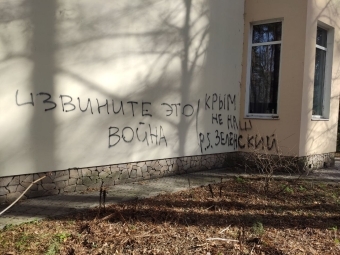
Russian soldiers wrote “This Is War” on the outside of a home.
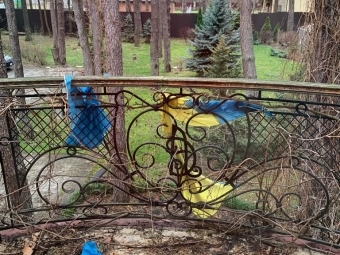
The Russian invaders left a family’s home—and Ukrainian flag—in tatters.
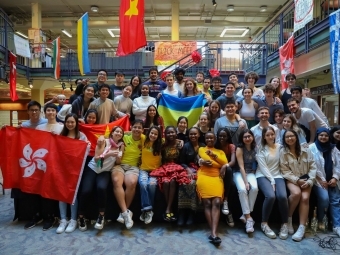
Ukraine’s blue and yellow flag at the college’s International Festival in October.
Saturday Social Outlet
The refugees include Halyna Ratushna, her daughter, Iryna Sizikova and Iryna's 11-year-old son, Ihor.
For Thanksgiving, they visited the home of a Ukrainian American family in Mooresville who are active in the Davidson 4 Ukraine community. They enjoyed Ukrainian and American foods that included turkey, pumpkin pie, sweet potatoes and cabbage rolls.
Davidson 4 Ukraine hosts meetups every Saturday for the Ukrainians. Their growing number of local friends have pitched in with everything from grocery store gift cards to furniture to handmade quilts. They have helped place the refugees in jobs, housing and schools.
Russian Studies Professor Amanda Ewington and Motria Procyk, a Ukrainian American and administrator at The Pines, serve as Davidson 4 Ukraine leaders. Procyk’s husband, Greg Snyder, a religious studies professor at Davidson, is among the many college community members who help. (Procyk and Snyder, with Davidson residents Aimee Symington and George Husk, are also Valeriia Kruzhkova’s local host families.)
The weekly gatherings offer a chance to socialize over coffee and doughnuts. The Ukrainian and Russian languages flow loud and freely. Young kids play joyfully outside. The grownups hug and laugh and talk, sometimes lapsing into concerned conversations about the war.
“Some of these people have been traumatized. The winter has been especially tough when they hear about the bombings of power grids and their families living without heat or water in the freezing cold,” Ewington said. “We wanted this to be a social time for them to get a little break from their many worries, and not feel so isolated.”
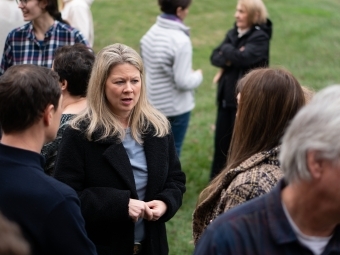
A Davidson 4 Ukraine gathering in early December

Davidson Tutors
Some families have young children now attending local schools.
Iryna Sizikova’s son, Ihor, started at Davidson K-8 School in fall. Like his mother, he speaks Ukrainian, Russian and English. Other children spoke only Russian before arriving. Davidson College students stepped in to make their transition easier.
Once a week, students in the college’s Russian Studies Program head to the school to tutor the Ukrainian children. At first the kids seemed shy, but as they got to know their tutors and learned English, they became far more outgoing.
“They’ve been so helpful to my son and the other children,” Sizikova said. “Everyone here has done so much to make us feel welcome.”
Kate Spencer ’24, a Russian studies and political science double major, was studying for an exam last February when news broke that Russia had attacked Ukraine. She’d been following Russia’s encroachment closely.
“For weeks the warnings had been coming,” she said. “It was clearly going to happen but so hard to believe it actually did. It really hit close to home for people here with family and friends in the region.”
Robert Sparks ’23, a political science major, made many friends, including his host family, while studying abroad in Ukraine two years ago. He was floored when Russia invaded Ukraine and worries about his friends there. He now tutors Ukrainian children at Davidson K-8.
“When it first happened, we felt helpless and didn’t know what to do,” he said. “This is something we could do.”
Davidson K-8 teachers say the tutors offer invaluable support.
“Teachers love seeing our students interact with the Davidson College students—it’s huge, we’re so lucky to be right down the street,” said Matt Lineback, a multilingual learner teacher at Davidson K-8. “These are really bright kids who’ve been through a lot. When they’re with their tutors, they aren’t insecure about mispronouncing words, they just come to life, their eyes light up and their personalities shine through.”
Spencer loves the welcome she gets as a tutor.
“I hope they feel like we offer them a safe space where they feel comfortable,” she said. “I hope they feel fully understood and heard.”
When she first started tutoring, a teacher introduced her to one of the students. Spencer greeted the little girl in Russian.
“She got the biggest smile on her face,” Spencer said, “when she realized I could talk to her.”
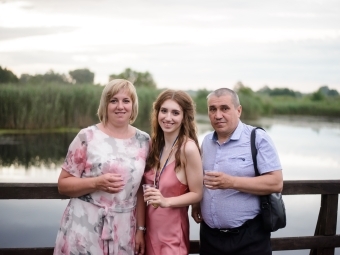
Valeriia Kruzhkova with her parents, Olena and Mykhailo
Under Attack
Valeriia Kruzhkova planned to spend a gap year working as a bank manager in Kyiv to earn money for college when the Russian bombs forced her out of the city.
She was horrified, terrified, angry and filled with grief, but grateful to get a spot on a packed bus that took her to her family in eastern Ukraine. Those feelings swirled through the next months. She’d been accepted to Davidson but as the battles spread across Ukraine, feared she wouldn’t be able to get there.
Then she got an email from Davidson telling her that another student’s parents had offered her their apartment in London.
Daniel Szlapak’s Jewish grandparents fled from Poland to Kenya when the Nazis trampled through Europe during World War II, slaughtering millions of Jews. His wife, Catherine, also grew up in Kenya, where they raised their daughter, Arella ’24, and son, Toby, a first-year student at Boston College.
They have a second home in London and when Russia attacked Ukraine, the Szlapaks felt compelled to help. They volunteered to host refugees and reached out to Davidson, offering their London apartment to any students from Ukraine who needed a safe place.
Kruzhkova contacted them and they assured her she’d be welcome. The Szlapaks set up a Zoom call for their two families.
“We knew how worried they must be, and it was important that they saw us as a family,” Catherine Szlapak said. “Valeriia’s parents don’t speak English, so she translated. I think they felt better after that meeting.”
It took Kruzhkova months to obtain a travel visa and when she finally did, she took a 17-hour bus ride to Warsaw, Poland, then got on a plane for London.
“It was such a hard drive across Ukraine,” she said. “I saw so many houses destroyed by the Russians, it was so heartbreaking. I could not believe this was happening to my country.”
Her two-day journey ended at London Luton Airport, where Catherine Szlapak, who she’d only met on Zoom, greeted her with a big hug.
Szlapak helped her open a bank account, navigate London’s Tube transportation system, and get a visa to travel to the United States. Kruzhkova connected with a Ukrainian social club close to the apartment and volunteered as a tutor to other refugees learning English. In summer, the Szlapak family joined her in London before everyone left for college
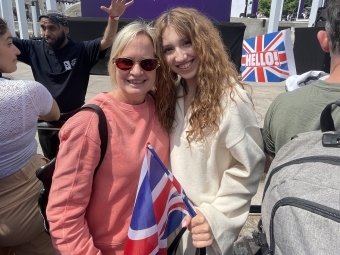
Catherine Szlapak and Valeriia Kruzhkova
“She became part of our family,” Catherine Szlapak said. “She’s one of us.”
Their parting was poignant.
“We had quite an emotional goodbye,” Catherine Szlapak said. “We agreed to say, ‘see you later,’ not ‘goodbye.’ Valeriia is very special. She’s so determined and brave and strong, and I know she’ll make the most of everything life has to offer.”
Kruzhkova regards the Szlapaks with deep affection.
“They have been so very kind to me,” she said. “Catherine has been my second mom; I know she cares about me a lot. I don’t know how I’ll ever be able to pay them back for everything they’ve done."
Heartsick About Home
After a semester studying abroad, Arella Szlapak is back at Davidson, where she’s happy to see Kruzhkova settled. Though they have different and very busy schedules, they recently caught up over dinner.

Valeriia Kruzhkova (center) with Daniel, Arella ’24, Toby and Catherine Szlapak at the Henley Royal Regatta in England
“She’s become like a sister,” Arella said. “Valeriia is such a wonderful part of our family. Having someone who’s family here at Davidson is so nice.”
Szlapak said she and her family worried about Kruzhkova being alone and so far away during her first year of college while contending with the traumatic events going on in Ukraine.
“I hope she could feel the love we were sending her,” Szlapak said. “Having things so out of your control must be so hard. The fear and uncertainty of your family not being safe seems unbearable. Valeriia is probably the bravest, strongest person I’ve ever known.”
Kruzhkova spent Christmas in Davidson and New Year’s in London, where she stayed at the home of the Szlapaks’ neighbors and celebrated with friends.
“New Year’s has always been one of my favorite holidays because it’s always a chance for a new start and new possibilities,” she said. “That’s especially true this year.”
February, with Valentine’s Day and then her birthday two weeks later, used to be her favorite month. Now, it’s a reminder of the misery inflicted upon her country.
At home, people deal with power and heat outages, food shortages and the ever-present threat of danger. Her 14-year-old brother, Dima, still goes to school, which is often interrupted by the air raid sirens that force everyone to shelter in the basement.
“I’ll ask my mom how she is, and she always says, ‘I’m okay,’” Kruzhkova said. “But I know she’s not okay. None of this is okay.”
Like many Ukrainians, she believes her country will prevail. “We’re 100 percent sure we’ll win this war but at what price?” she asks. “I’m happy and so grateful to have people who have accepted me into their families and made me feel so welcome and safe. I just want my family in Ukraine to also be happy and safe.”
On Feb. 23, 2023, an awareness and fundraising evening was held on Davidson's campus to commemorate the one-year anniversary of Russia’s full-scale invasion of Ukraine, and to celebrate Ukrainian resilience.
This article was also published in the Spring/Summer 2023 print issue of the Davidson Journal Magazine; for more, please see the Davidson Journal section of our website.


